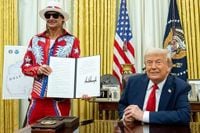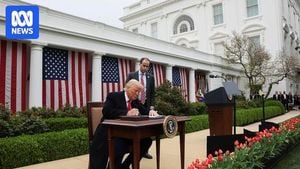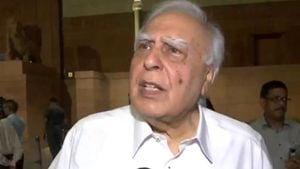In a significant move to protect concertgoers from exploitative ticket scalping, President Donald Trump signed an executive order on March 31, 2025, aimed at enforcing the Better Online Ticket Sales (BOTS) Act. The order, which was signed in the Oval Office with musician Kid Rock in attendance, directs various government agencies to take a more aggressive stance against ticket scalpers and the automated software that facilitates their practices.
"He's [Kid Rock] been after something that is for the good of a lot of people, including in particular the public and having to do with ticket sales and scalping and all of the gouging that you have been reading about," Trump stated, highlighting the growing concern over ticket pricing and availability. Kid Rock, a well-known supporter of Trump, expressed his gratitude for the swift action taken by the administration, noting that the problem of inflated ticket prices has persisted for years.
"Anyone who's bought a concert ticket in the last decade, maybe 20 years — no matter what your politics are — knows it is a conundrum," Kid Rock remarked. He pointed out that a ticket priced at $100 often ends up costing $170 by the time it is checked out, a situation that frustrates many fans.
The BOTS Act, originally sponsored by Senator Marsha Blackburn and signed into law by President Obama in 2016, was designed to curb the use of automated software that purchases large quantities of event tickets, allowing scalpers to resell them at inflated prices. However, enforcement of this law has been lackluster, with the Federal Trade Commission (FTC) only taking its first action against violators in 2021.
Trump's executive order aims to change that by directing the FTC to rigorously enforce the BOTS Act and to promote its enforcement by state consumer protection authorities. The order also emphasizes the importance of price transparency at all stages of the ticket-purchase process, including in the secondary ticketing market.
In addition to enforcing the BOTS Act, the executive order tasks the Attorney General and the FTC with ensuring that competition laws are appropriately enforced in the concert and entertainment industry. This includes monitoring venues and ticketing agents to prevent practices that harm both artists and fans.
Moreover, the order calls for the Secretary of the Treasury and the Attorney General to ensure that ticket scalpers comply with the Internal Revenue Code and other applicable laws. Within 180 days, the Treasury, the Department of Justice, and the FTC are expected to deliver a report summarizing actions taken to address unfair practices in the live concert and entertainment industry and recommend additional regulations or legislation needed to protect consumers.
Trump's initiative has garnered support from several ticketing companies. Live Nation, the parent company of Ticketmaster, issued a statement applauding the president's executive order and calling for a cap on resale prices. "Scalpers and bots prevent fans from getting tickets at the prices artists set, and we thank President Trump for taking them head-on," the company stated.
StubHub, another major player in the ticket resale market, also expressed its support, stating, "StubHub applauds President Trump for taking steps to better protect fans from ticket bots and bad actors who exploit vulnerabilities in the primary ticket market." The company welcomed the push for more transparency and competition in the industry.
Despite the positive reception from some industry players, skepticism remains. Festive Owl, an independent source of music festival news, cautioned that while a signature is easy, meaningful change is harder to achieve. Similarly, the Future of Music Coalition, a nonprofit organization advocating for fair compensation in the music industry, acknowledged the reasonableness of the order's action items but raised concerns about the propriety of a president directing the FTC's agenda.
The controversy surrounding ticket scalping is not new, and it has drawn criticism from both sides of the political spectrum. During the previous administration, the Justice Department filed a lawsuit against Live Nation Entertainment, alleging that it monopolized access to events. Ticketmaster, in particular, has faced renewed scrutiny due to its handling of ticket sales for major events, including Taylor Swift's "Eras" tour.
Experts estimate that Ticketmaster controls over 70% of the primary ticketing market for major U.S. concert venues, leading to concerns about its influence over ticket pricing and availability. As the concert industry continues to grapple with these issues, Trump's executive order represents a significant step towards addressing the long-standing problems of ticket scalping and market manipulation.
In conclusion, this executive order could potentially reshape the landscape of ticket sales, offering hope to concertgoers who have been frustrated by the practices of scalpers and bots. The success of the initiative, however, will ultimately depend on the commitment of government agencies to enforce the laws effectively and ensure fair competition in the entertainment market.





